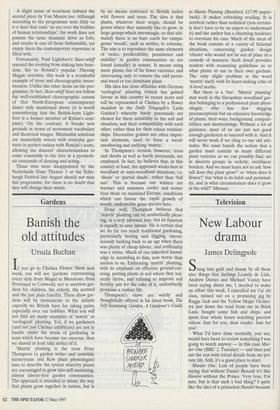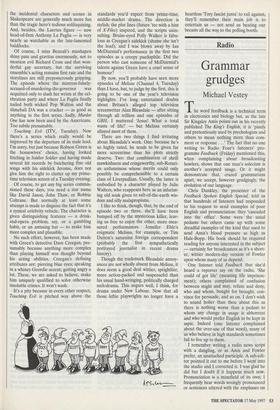Television
New Labour drama
James Delingpole
Stung into guilt and shame by all those nice things that darlings Leanda de Lisle, Andrew Davies and Michael Vestey have been saying about me, I decided to make an effort this week. I cancelled my t'ai chi class, missed out on a promising gig by Ragga Jack and the Yellow Magic Orches- tra just down the road from me in Brick Lane, bought some fish and chips, and spent four whole hours watching preview videos. Just for you, dear reader. Just for you!
What I'd have done normally, you see, would have been to review something I was going to watch anyway — in this case Mur- der One (BBC 2, Tuesday) — and then pad out the rest with trivial details from my pri- vate life. Still, it's a good place to start.
Murder One. Lots of people have been saying that without Daniel Benzali it's like Hamlet without the Prince. Very true, I'm sure, but is that such a bad thing? I quite like the idea of a princeless Hamlet because the incidental characters and scenes in Shakespeare are generally much more fun than the tragic hero's tedious soliloquising. And, besides, the Laertes figure — new head-of-firm Anthony La Paglia — is very nearly as watchable as the late-lamented bald ilocks.
Of course, I miss Benzali's misshapen shiny pate and gravitas enormously, not to mention evil Richard Cross and that won- derful gay secretary, but the surviving ensemble's acting remains first rate and the storylines are still preposterously gripping. The episode where the mistress-falsely- accused-of-murdering-the-governor was acquitted only to slash her wrists at the cel- ebration party and where La Paglia finally nailed both wicked Pop Walton and the slimeball DA was a cracker — as good as anything in the first series. Sadly, Murder One has now been axed by the Americans. Too subtle presumably.
Touching Evil (ITV, Tuesday). Now there's a series which really would be improved by the departure of its male lead. I'm sorry, but just because Robson Green is the housewives' choice, having looked fetching in Soldier Soldier and having made several hit records by butchering fine old songs with his sidekick Jerome, does not give him the right to clutter up my prime- time television screen of a Tuesday evening.
Of course, to get any big series commis- sioned these days, you need a star name like David Jason, John Thaw, or Robbie Coltrane. But normally at least some attempt is made to disguise the fact that it's a cynical celebrity vehicle. The character is given distinguishing features — a drink- and-opera problem, say, or a gambling habit, or an amusing hat — to make him more complex and plausible.
No such effort, however, has been made with Green's detective Dave Creegan, pre- sumably because anything more complex than playing himself was thought beyond his acting abilities. Creegan's defining attributes are: piercing blue eyes; speaking in a whiney Geordie accent; getting angry a lot. These, we are asked to believe, make him uniquely qualified to solve otherwise insoluble crimes. It won't wash.
It's a pity because in every other respect, Touching Evil is pitched way above the standards you'd expect from prime-time, middle-market drama. The direction is stylish; the plot lines (future 'tec with a hint of X-Files) inspired, and the scripts unin- suiting. Bruise-eyed Polly Walker is fabu- lous as Creegan's sidekick (shame she isn't the lead), and I was blown away by Ian McDiarmid's performance in the first two episodes as a creepy paedophile. Did the person who cast someone of McDiarmid's talents against Green have a cruel sense of humour?
By now, you'll probably have seen more episodes of Melissa (Channel 4, Tuesday) than I have, but, to judge by the first, this is going to be one of the year's television highlights. I've long entertained doubts about Britain's alleged top television screenwriter Alan Bleasdale — after sitting through all trillion and one episodes of GBH, I muttered 'Jesus! What a total waste of life!' — but Melissa certainly allayed most of them.
There are two things I find irritating about Bleasdale's work. One: because he's so highly rated, he tends to be given far more screentime than his plots strictly deserve. Two: that combination of shrill mawkishness and cringeworthy, sub-Rotari- an unfunniness whose merits could only possibly be comprehensible to a certain class of Liverpudlian. Usually, the latter is embodied by a character played by Julie Walters, who reappears here as an infuriat- ing old soak given to salt-of-the-earth wis- dom and silly malapropisms.
I like to think, though, that, by the end of episode two or three, she'll have been bumped off by the mysterious killer, leav- ing us free to enjoy the other, more mea- sured performances. Jennifer Ehle's enigmatic Melissa, for example, or Tim Dutton's saturnine foreign correspondent (probably the first sympathetically portrayed journalist in recent drama history).
Though the trademark Bleasdale annoy- ances are not wholly absent from Melissa, it does seem a good deal wittier, sprightlier, more action-packed and suspenseful than his usual hand-wringing, politically charged melodrama. This augurs well, I think, for drama under New Labour. Now that all those leftie playwrights no longer have a heartless 'Tory fascist junta' to rail against, they'll remember their main job is to entertain us — not send us beating our breasts all the way to the polling booth.



































































 Previous page
Previous page